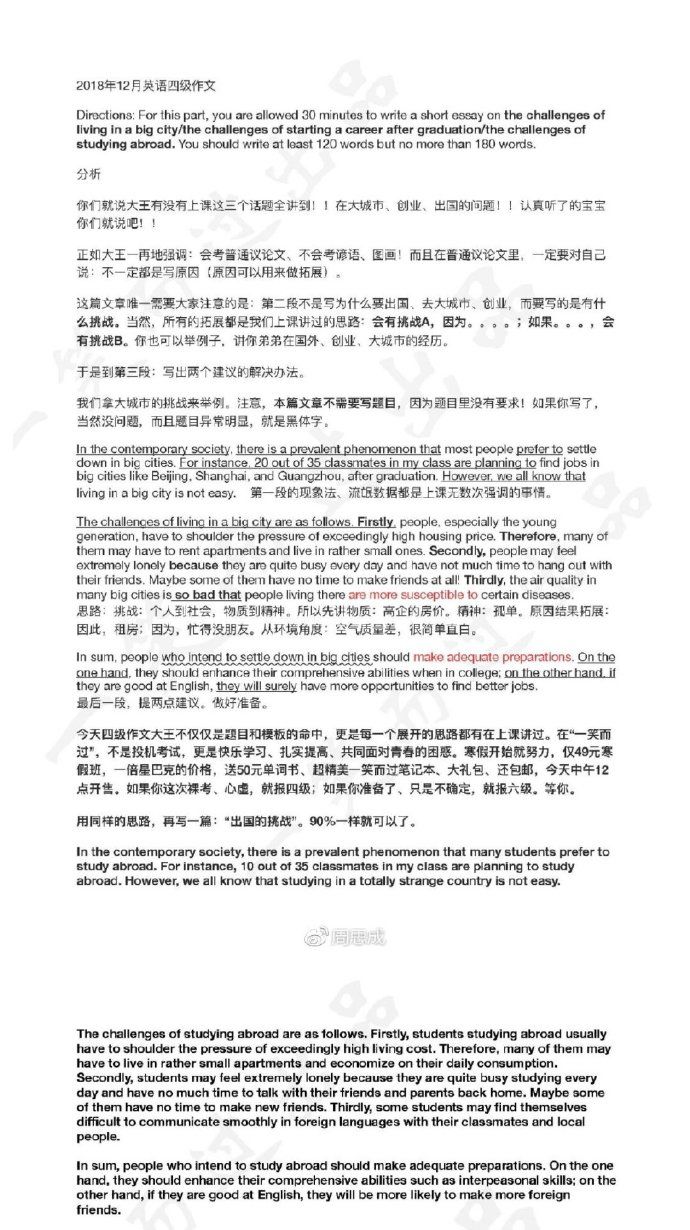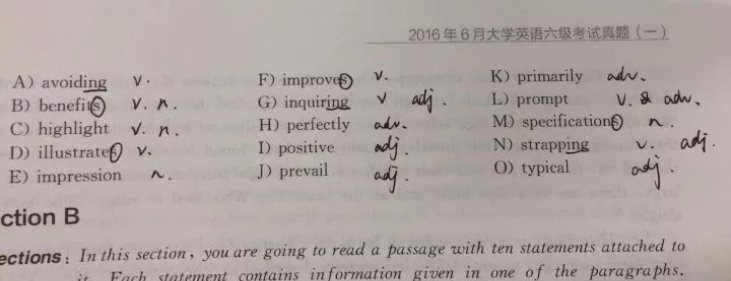2009专八真题及参考答案(最新版)
|
编辑的话:专八刚刚考过,24EN即在第一时间提供听力部分MP3资料的在线试听和下载;并在第一时间推出09专八真题(影印版)。同时24EN也特邀周玉亮老师推出相对权威的参考答案版本。周玉亮老师曾经在专八考试中考过接近90分的成绩,也培养过许多专八成绩为优良(70分以上)或优秀(80分以上)的同学。希望他的参考答案能对大家评估自己在专八中的表现有很好的参考作用。 需要说明的是:参考答案或许与标准答案有些许出入,仅供各位网友参考使用。也各位网友理解我们的良苦用心,并一如既往地支持www.engbus.cn. 点击进入:09专八考后在线答疑! 点击下载:2009英语专业八级考试(TEM8)听力音频下载地址 点击阅读:2009英语专业八级考试(TEM8)试卷真题 Mini Lecture 参考答案 (近期提供) 听力部分 1-5 CBABA 6-10 BCBAB (周玉亮版本) 阅读部分参考答案 11-15 CADBD 16-20 DCBDB 21-25 BDCAA 26-30 DDDDA (周玉亮版本) 人文知识参考答案 31-35 DBACD 36-40 BCDCA (周玉亮版本) 汉译英参考答案(周玉亮推荐版本) Cell phone has altered human relations. There is usually a note on the door of conference room, which reads "close your handset|." However, the rings are still resounding in the room. We are all common people and has few urgencies to do. Still, we are reluctant to turn off the phone. Cell phone symbolizes our connection with the world and reflects our "thirst for socialization." We are familiar with the scene when a person stops his steps to edit short messages with eyes glued at his phone, disregard of his location, whether in road center or beside restroom.
但是,时下世界上的许多国家领导人可以用当年温斯顿·丘吉尔批评欧洲诸政要忽视阿道夫·希特勒的名言来形容,“它们在奇怪的悖论中前行,仅仅为一个决定而犹豫不决,有了决心却拖泥带水,信心犹疑不定,见解随波逐流,掌权者虚弱无力。” 而如今我们向这个星球脆弱的大气层倾倒超过七千万吨温室气体,把其当作天然排污口。明天我们还会变本加厉,堆积的温室气体吸纳了越来越多的太阳热度。 改错部分参考答案 (周玉亮版本) (1)illustrate改为illustrated(与前文的shown保持一致) Are Dialects Just as Acceptable in Public Places Instruction: Mandarin, or putonghua, is the standard service sector language in China. However lately some employees of a metropolis subway company start using dialects to cater to the requirements of people from different areas in order to render better service. Opponents sees the countering effects of such movement to the national policy of promoting mandarin across China. Write in 400 words your opinion and support your argument and bring your essay to a natural conclusion.
China's State Administration of Radio Film and Television (SARFT) recently issued a notice banning domestic radio and TV stations from translating foreign radio and TV programmes into any local dialect. The notice said that such dialect translation contradicts the national initiative to promote Putonghua, or Mandarin, around the country. Foreign programmes that have been translated into dialects must be removed from television and radio immediately. The notice evoked a mixed response from experts and audio and video producers, as well as the general public. Many voiced their concerns that local dialects would be fornidden in public places. Mandarian, which means "common language", is the country's predominant language and is widely used by more than 70 percent of the population. However, local dialects still enjoy pupularity for relatively less-educated people in some occasions. The dialects do make unique role and should be tolerated for existence in public places. Though promoted widely in public places, dialects are acceptable in public places. First, it is more than a mere tool for communication. It is, most importantly, the messenger of its respective culture. If the dialect was eliminated from daily use, the culture will be broken. Second, Mandarian can absorb the elit part of local dialect to enrich its vovabulary and usuge. This is the perfection of Mandartian from thousands of years blend and contact. The dialects can also be popular in the public. Along with the famous short play by comic actors in NE China, the local dialect came into the splotlight, and enjoyed more pupulatity throughout China. Such a cultural phenomenon represents the audience an attitude to local dialects which cater to the taste of the majority. Third, dialect is the only mean of communication to some undereducated local people. If local dialects are fobbiden in the public places, they can not communicate. To sum up, local dialects should be tolerated in public places for its unique role which Mandarian can not substitute. We should guartee its survival because dialects stand for our spiritual land. From a long-term perspective, dialects should not and would not be wiped out. There is no need for any purposeful and deliberate attempt to protect dialects. Just let dialects take their natural course. The best way to protect a dialect is to use it in daily life and pass it down from generation to generation. |








